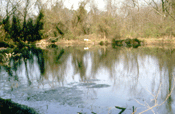Watercress Darter National Wildlife Refuge: Difference between revisions
(Missed a Wikipedia update, apparently.) |
m (Watercress darter template) |
||
| (One intermediate revision by the same user not shown) | |||
| Line 1: | Line 1: | ||
[[Image:Watercress Darter NWR.gif|right|thumb| | [[Image:Watercress Darter NWR.gif|right|thumb|250px|Watercress Darter National Wildlife Refuge]] | ||
'''Watercress Darter National Wildlife Refuge''' is a 23 acre National Wildlife Refuge around [[Thomas Spring]], which is within the city limits of [[Bessemer]], created exclusively to protect the endangered [[watercress darter]]. It is the smallest National Wildlife Refuge in the United States. The facility is unstaffed, but is administered by the Mountain Longleaf National Wildlife Refuge in Anniston and monitored by volunteers. | '''Watercress Darter National Wildlife Refuge''' is a 23 acre National Wildlife Refuge around [[Thomas Spring]], which is within the city limits of [[Bessemer]], created exclusively to protect the endangered [[watercress darter]]. It is the smallest National Wildlife Refuge in the United States. The facility is unstaffed, but is administered by the [[Mountain Longleaf National Wildlife Refuge]] in [[Anniston]] and monitored by volunteers. [[Sarah Clardy]] is manager of both those refuges. | ||
The refuge is open to the public and offers limited opportunities for hiking and wildlife photography. Fishing is not permitted on the refuge for the protection of the watercress darter. | The refuge is open to the public and offers limited opportunities for hiking and wildlife photography. Fishing is not permitted on the refuge for the protection of the watercress darter. | ||
| Line 10: | Line 10: | ||
A second pond was built and vegetated downstream from Thomas Spring in [[1983]]. In January [[1988]], 100 watercress darters were relocated from Thomas Spring into this newly constructed pond. | A second pond was built and vegetated downstream from Thomas Spring in [[1983]]. In January [[1988]], 100 watercress darters were relocated from Thomas Spring into this newly constructed pond. | ||
{{Watercress darter}} | |||
==External links== | ==External links== | ||
| Line 17: | Line 19: | ||
== References == | == References == | ||
* Watercress Darter National Wildlife Refuge [http://en.wikipedia.org/w/index.php?title=Watercress_Darter_National_Wildlife_Refuge&oldid=62448590]. (July 6, 2006). Wikipedia, The Free Encyclopedia. Accessed 15:23, March 6, 2007. | * Watercress Darter National Wildlife Refuge [http://en.wikipedia.org/w/index.php?title=Watercress_Darter_National_Wildlife_Refuge&oldid=62448590]. (July 6, 2006). Wikipedia, The Free Encyclopedia. Accessed 15:23, March 6, 2007. | ||
* Bouma, Katherine. "Professor reveals darter reserve" ( | * Bouma, Katherine. (September 26, 2008). "Professor reveals darter reserve." ''The Birmingham News''. | ||
* Roop, Lee. (October 19, 2011). "[http://blog.al.com/breaking/2011/10/wheeler_wildlife_refuge_has_ne.html Three Alabama wildlife refuges get new federal manager]." ''The Huntsville Times''. | |||
[[Category:Wildlife refuges]] | [[Category:Wildlife refuges]] | ||
[[Category:Bessemer]] | [[Category:Bessemer]] | ||
[[Category:1980 establishments]] | [[Category:1980 establishments]] | ||
Latest revision as of 01:21, 6 February 2015
Watercress Darter National Wildlife Refuge is a 23 acre National Wildlife Refuge around Thomas Spring, which is within the city limits of Bessemer, created exclusively to protect the endangered watercress darter. It is the smallest National Wildlife Refuge in the United States. The facility is unstaffed, but is administered by the Mountain Longleaf National Wildlife Refuge in Anniston and monitored by volunteers. Sarah Clardy is manager of both those refuges.
The refuge is open to the public and offers limited opportunities for hiking and wildlife photography. Fishing is not permitted on the refuge for the protection of the watercress darter.
History
Watercress darters were first found in Thomas Spring in 1976, which was then private property. It was the first population found since the species' discovery in Glenn Spring in 1964. Thomas Spring had been dammed approximately 20 years earlier, producing a pond that was an ideal habitat for the fish. In 1977 the land owner introduced grass carp to clear the spring of vegetation, which they had mostly done by October. During this time, sampling collected only one darter.
On October 1, 1980, the U.S. Fish & Wildlife Service purchased 7 acres of property around Thomas Spring exclusively to protect the watercress darter. The main feature of the refuge is a quarter-acre pond along the spring which is essential to the survival of the fish. After establishment, the grass carp were removed and, in early 1981, the spring was re-vegetated. Shortly thereafter, the refuge was restocked with darters from Glenn Springs.
A second pond was built and vegetated downstream from Thomas Spring in 1983. In January 1988, 100 watercress darters were relocated from Thomas Spring into this newly constructed pond.
| Watercress darter (Etheostoma nuchale) | |
|---|---|
| Habitats | Glenn Springs · Nabors Branch · Roebuck Spring · Tapawingo Springs · Thomas Spring · Turkey Creek |
| Preserves | Seven Springs Ecoscape · Turkey Creek Nature Preserve · Watercress Darter National Wildlife Refuge |
| People | R. D. Caldwell (co-discoverer) · Larry Davenport · Mike Howell (co-discoverer) · Heron Johnson |
External links
References
- Watercress Darter National Wildlife Refuge [1]. (July 6, 2006). Wikipedia, The Free Encyclopedia. Accessed 15:23, March 6, 2007.
- Bouma, Katherine. (September 26, 2008). "Professor reveals darter reserve." The Birmingham News.
- Roop, Lee. (October 19, 2011). "Three Alabama wildlife refuges get new federal manager." The Huntsville Times.
